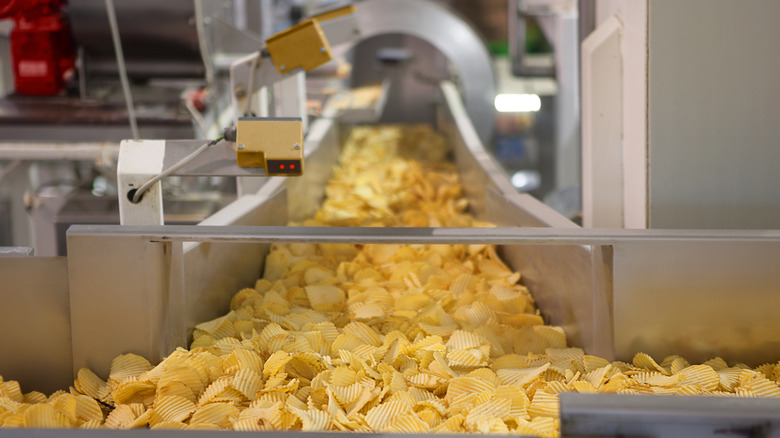The Common Food Processing Step That's Detrimental To Our Health
The next time you eat a potato chip, consider how many stages a potato goes through to be formed into that thin, can't-eat-just-one chip. Sure, you can make homemade "chips" by slicing a potato extra thin, but they don't have that same crispy taste as when they come out of a bag. If you can't make your favorite types of food in your own kitchen, chances are that food has gone through a bit of processing. According to a 2016 article in World Nutrition, your potato chips are considered an ultra-processed food. Ultra-processed foods typically have five or more ingredients, and most of those ingredients are probably not even found in Gordon Ramsay's or Guy Fieri's kitchens. Many of them are also cooked and processed in ways that can't be done in an ordinary kitchen.
Ultra-processed foods are linked to obesity, diabetes, cardiovascular disease, and all-cause mortality, per a 2022 article in Critical Reviews in Food Science and Nutrition. That's because many of these mass-produced foods go through an extrusion process that can affect how your body processes food.
What extrusion food processing does to food
Extrusion is mostly used with ingredients like corn, wheat, rice, and soybean, as stated in a 2020 review in the Indian Journal of Pure and Applied Biosciences. In the extrusion process, raw ingredients are fed into a machine where they're heated and pressurized, losing their original structures. The machine then shapes the food into different forms, such as pasta corkscrews, spheres, and rods.
According to the Washington Post, the extrusion process strips natural grains of their necessary fiber and other nutrients, even though the refined versions of these grains often make our favorite foods so tasty. Yet when the extrusion process breaks up the starch, it causes these foods to be absorbed more quickly by our digestive system because they've essentially been predigested by the extrusion process. This can impact our blood sugar and insulin levels. Many of these ultra-processed foods also have excess salt, sugar, and fat that make them difficult to put down.
What ultra-processed foods can do to your body
Although many studies have shown links between ultra-processed foods and chronic health conditions, a 2019 article in Cell Metabolism found a direct link between ultra-processed food and weight gain. The study had 20 people stay at the NIH Clinical Center and eat as little or as much as prescribed from a menu of either ultra-processed or unprocessed foods for two weeks. After the first two weeks were over, the people switched to the opposite menus.
The ultra-processed menu would include packaged cereals, canned ravioli, packaged cookies, and turkey meatball subs. The unprocessed menu included unsweetened Greek yogurt with fresh fruit, spinach salad with cooked chicken breast and apple slices, and beef tender roast with green beans. When the people ate ultra-processed foods, they ate 500 more calories a day and gained weight after a two-week period. While eating food from the unprocessed menu, they ate less and lost weight.



